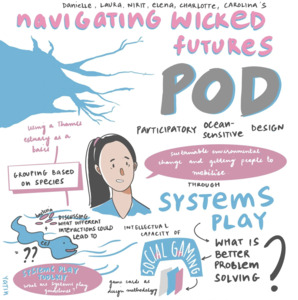Navigating Wicked Futures Through More-Than-Human Perspectives: Experiments in design education
Barrios-O’Neill, Danielle, Dudek, Laura, Ben Meir, Nirit Binyamini, Falomo, Elena, Jarvis, Charlotte and Ramirez-Figueroa, Carolina (2022) Navigating Wicked Futures Through More-Than-Human Perspectives: Experiments in design education. In: Proceedings of Relating Systems Thinking and Design, RSD11, 3-16 Oct 2022, Brighton, United Kingdom.
Preview |
Text
Barrios-O’Neill_Navigating_Paper_2022.pdf - Published Version Available under License Creative Commons Attribution Non-commercial No Derivatives. Download (131kB) | Preview |
![Sketchnote by Patricia Kambitch [thumbnail of Sketchnote by Patricia Kambitch]](https://openresearch.ocadu.ca/4353/2.hassmallThumbnailVersion/Barrios-O%E2%80%99Neill_Sketchnote1_Image_2022.png)  Preview |
Image (Sketchnote by Patricia Kambitch)
Barrios-O’Neill_Sketchnote1_Image_2022.png - Published Version Available under License Creative Commons Attribution Non-commercial No Derivatives. Download (3MB) | Preview |
![Sketchnote by Yatin [thumbnail of Sketchnote by Yatin]](https://openresearch.ocadu.ca/4353/3.hassmallThumbnailVersion/Barrios-O%E2%80%99Neill_Sketchnote2_Image_2022.png)  Preview |
Image (Sketchnote by Yatin)
Barrios-O’Neill_Sketchnote2_Image_2022.png - Published Version Available under License Creative Commons Attribution Non-commercial No Derivatives. Download (2MB) | Preview |
Abstract
This presentation discusses the design and outcome of POD (Participatory Ocean-Sensitive Design), a game combining strategy and experimental design. It was developed as an instantiation of systems play, a mode of collaborative speculative world-building. The game presented a speculative scenario demonstrating a plausible outcome of current human responses to climate change, employing conventions of design fiction and pervasive games (Raby, 2018). In POD, players were assigned species identities, oriented within one of four locally connected habitats, and prompted to respond to ecosystemic conditions of anthropogenic climate change at different scales and across different time horizons (Biggs et al., 2015). We will discuss the method underlying the design, which is intended to prime groups through play to manage complexity and uncertainty. The experience was created and tested by Information Experience Design (IED) specialists from the Royal College of Art within a four-month project funded by the British Academy. It employs the unconventional strengths of art and design experimentation, most notably a positive orientation toward uncertainty, to generate social cohesion and creative problem-solving around shared goals. As a learning mode and engagement tool, systems play has exciting potential to destabilise established norms of problem-solving and orient collaboration toward system-wide resilience.
| Item Type: | Conference/Workshop Item (Paper) |
|---|---|
| Uncontrolled Keywords: | Systemic design, immersive games, social games, more-than-human perspectives, time, ecocentric design, emergent behaviour, methodologies, design education, speculative design |
| Divisions: | Faculty of Design |
| Date Deposited: | 30 Apr 2024 14:12 |
| Last Modified: | 30 Apr 2024 14:12 |
| URI: | https://openresearch.ocadu.ca/id/eprint/4353 |
Actions (login required)
 |
Edit View |

 Tools
Tools Tools
Tools